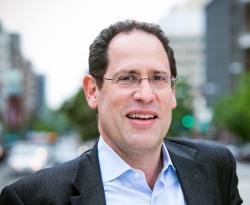Throughout the world, cities have become the undisputed engines of national economies. They have also proven themselves to be the actors most focused on overcoming the complex challenges of our time, like reducing inequality, boosting social mobility, integrating immigrants and mitigating the effects of climate change. For too long, national political discourse has overlooked this reality. Not for much longer. The rise of cities is set to become the focus of a new era of political competition between national parties of all ideological stripes and dimensions.
Particularly in the United States and Europe, there has been a fundamental mismatch in the de facto allocation of responsibilities and the de jure devolution of power. Time and again—and in nation after nation—central governments have failed to confront difficult social and economic problems, causing responsibility to informally devolve downward to cities and metropolitan areas. Yet official power has remained vested in central and state governments, primarily in siloed, anachronistic bureaucracies that circumscribe the ability of local leaders to tailor solutions to local needs and conditions. This mismatch has begun to break through the public consciousness, causing an intriguing question to arise—which national political parties will willingly devolve official power to their rising cities so that the design and delivery (and even the financing) of solutions can happen closer to ground?
In the United Kingdom, the most centralized of nations, the mantle of devolution has initially been assumed by the Tories and the center-right. The support for city-region mayors—and the promotion of government initiatives like the Northern Powerhouse, City Deals, and Devolution Agreements (particularly with forward-leaning cities like Manchester)—recognizes that cities are complex, distinctive economies that cannot be micro-managed from Whitehall and that one size cannot fit all, even in a nation as physically small as England.
The Labour Party’s response to the Tory enthusiasm for devolution has been mixed. At the national level, Jeremy Corbyn, the Labour Party leader, has been suspicious of Tory advances, describing the Northern Powerhouse as a “cruel deception” and devolution as a “fig leaf” for austerity and budget cuts. By contrast, the Labour Party politicians who dominate local councils in cities like Manchester, Sheffield, and Liverpool are generally supportive of the devolution moves of the Tory government.
The pro-devolution wing of the Labour Party was recently given a voice in a remarkable speech by Tristram Hunt, a Labour Party member of Parliament and author of several books, including Building Jerusalem: The Rise and Fall of the Victorian City. Hunt’s speech is essential reading for several reasons.
Hunt argues that the Labour Pary “must go further and faster than the Tories on devolution…and embrace a new radical localism that puts power back in the hands of our communities and restores a sense of civic pride.” He makes three arguments in support of the notion that “a radical decentralization of power is essential for [the Labour Party’s] historic mission of reducing inequality.”
1. Cities are not monolithic.
“The needs of Stoke-on-Trent are different to the needs of Stoke Newington. And the fight for a better world always begins in your own back yard. You dig where you stand.
I believe local communities and local politicians will understand those different needs far better than civil servants in London.
The evidence for this is compelling. According to the OECD a more decentralized approach to government correlates with stronger growth, more social investment, better educational outcomes, higher wellbeing, and less regional inequality.
And more than that the growth it produces is much more inclusive with a significantly larger proportion of money staying within the community.”
2. Cities enable a higher order of democracy.
“Look around the world. Everywhere but everywhere centralized authority is in crisis. It does not speak to what people want in this fast-moving, hyper-connected, pluralistic world. People want a say. People want a stake. People want to participate. People want power.”
“The evidence clearly shows how devolved government is more responsive, accountable, trusted, knowledgeable, and innovative than Westminster when it comes to making difficult decisions in the community interest.”
“The lesson of urban history is that real political power always follows the money. If we want to reinvigorate local democracy then we need to give local authorities much more fiscal autonomy. What we also need are institutions that can help decentralize access to start-up capital and investment.”
3. Greater devolution will stimulate greater innovation.
“Decentralization offers the ability to deliver public services more effectively than the central state. Its greater capacity to ‘join-up’ public services beyond departmental silos gives the local state a crucial innovative edge in tackling the complexities of modern social injustice.
You cannot run 10,000 schools from Whitehall. On practical and ethical grounds, there has to be an element of local planning and democracy, of collaboration between schools for raising standards and spending money wisely.
We need to rip down the ring fences.
Move towards long budget cycles, unconstrained by departmental bickering.
Scorch the silos. People’s lives do not fit neatly inside them.
It is increasingly outdated to think our social justice ambitious ever could.”
Could political parties in the United States “embrace radical localism” during the governing that follows this election? In a subsequent blog, more on who “owns” devolution in the United States and what it might look like.
The Brookings Institution is committed to quality, independence, and impact.
We are supported by a diverse array of funders. In line with our values and policies, each Brookings publication represents the sole views of its author(s).



Commentary
Embracing radical localism
May 4, 2016